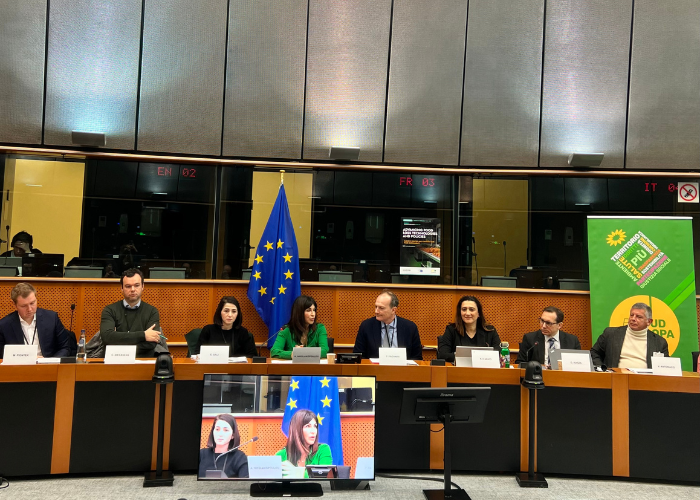Cutting Edge Solutions: Revolutionizing Food Loss and Waste StrategiesPRESS RELEASE
- 13 February 2024
- Posted by: Competere
- Categories: events, highlights, Media, News, Resilient Food Systems

ADVANCING FOOD LOSS TECHNOLOGIES AND POLICIES
***
The event “Advancing food loss technologies and policies” organized by Competere.eu in collaboration with Trane Technologies, hosted at the European Parliament in Brussels by the Greens/EFA MEP Rosa d’Amato, has just ended.
The round table was attended by professor (Gyula Kasza, University of Veterinary Medicine Budapest), MEPs (Rosa D’Amato Verdi/ALE, Salvatore De Meo Ppe, Ines Vaider Ppe), member of the European Commission (Alexandra Nikolakopoulou DG Sante) and stakeholders (Eva Sali Copa Cogeca, Federica Dolce Food&Drink Europe, Claudio Zanframundo Trane Technologies, Malte Piontek Schwarz Group, Christophe Diercxsens Too Good To Go, Federica Grassi SAFE – Safe Food Advocacy Europe, Vito Antonacci ZeroWaste).
“It is shocking that almost the 30% of food is lost or wasted, much of which happens during transport”, said Claudio Zanframundo, president of Thermo King EMEA, Trane Technologies. “We are proud to be working with Competere to bring together Members of the European Commission and the European Parliament and other critical groups to advance our collective efforts for reducing food loss in the global ‘cold chain’, including deploying technologies and innovative solutions at scale.”
FAO’s most recent estimates show that consumer food waste is only a part of the whole problem. In fact, a significant portion can be attributed to production processes and failure to comply with sustainability and conservation standards. If we focus on the fruit and vegetable sectors, for example, we detect losses close to 50% of total production. Having an efficient and sustainable ‘cold chain’ is decisive in containing these figures. This is where supply chain industries – from harvesting, to transport, to final distribution – must take a step forward.
“Globally, 1.3 billion tonnes of food are lost every year, while 850 million people do not eat enough, meaning a tenth of the world’s population lives in a state of food insecurity. Furthermore, the waste and non-consumption of food products generates 10% of annual global greenhouse gas emissions.” Said Pietro Paganini, president of Competere.eu, analyst, economic and (geo)political communicator.
“The problem of waste is complex and occurs throughout all phases of the food system: from production to transport to the table, from energy and water costs to the resources used in the distribution and conservation phases”, he continued.
What are the solutions?
“Education, recycling and technological efficiency. The awareness generated by educational programs and awareness campaigns that can spread a wave of knowledge and promote a turnaround towards more responsible choices. But not only that: there is the opportunity for recovery and the work of food banks and voluntary associations who together ensure that what is not consumed, and which remains untouched, reaches those in greater difficulty. Finally, there is technology, which allows the ‘cold chain’ distribution and packaging systems and storage tools to be made more efficient”, Mr. Paganini added.
“Today we heard the direct testimony of an international player. Thermo King’s refrigerated transportation and storage products, which include the latest innovations in electrification and digital monitoring capabilities [-70°C to +40°C] for air, sea and road, are transporting food safely every day. It is an industrial model of sustainability and containment of food safety that the European institutions must adopt, for community legislation tailored to agrifood and society”.
.
